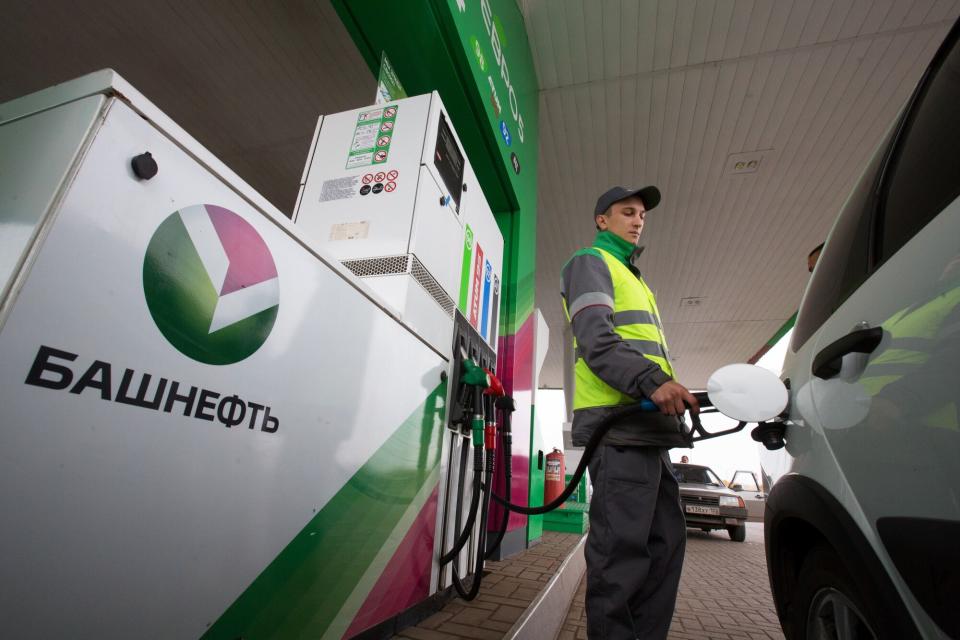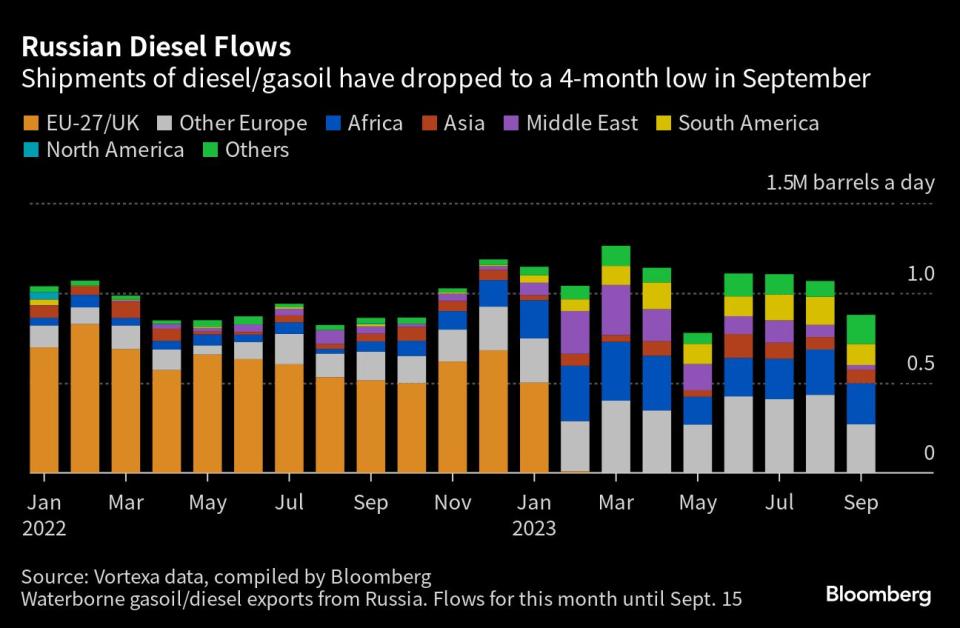Russia Temporarily Bans Diesel Exports; European Prices Jump
(Bloomberg) -- Russia temporarily banned exports of diesel in a bid to stabilize domestic supplies, driving European prices higher in already tight global fuel markets.
Most Read from Bloomberg
Ex-Goldman Bankers Make a Fortune With Controversial Bet on Coal
China’s Ultra-Rich Gen Zs Flock Home as Global Tensions Rise
McCarthy Ambushed as Republican Hardliners Change Course on Spending Plan
Open House: Seized HK Mansion Listed for $112 Million Traces Fall of Evergrande Tycoon
So far this year, Russia was the world’s single biggest seaborne exporter of diesel-type fuel, narrowly ahead of the US, according to Vortexa data compiled by Bloomberg. The country shipped more than 1 million barrels a day during January to mid-September, with Turkey, Brazil and Saudi Arabia being among the main destinations.
The ban, which also applies to gasoline, comes into force on Sept. 21, and doesn’t have a final date, according to the government decree.
Diesel prices in Europe jumped on concern the measure will aggravate global shortages. The world’s oil refiners are struggling to produce enough of the fuel amid curbed crude supplies from Russia and Saudi Arabia, the biggest producers within the Organization of Petroleum Exporting Countries and its allies.
“Despite this being only a temporary ban, the impact is significant as Russia remains a key diesel exporter to global markets,” said Alan Gelder, vice president of refining, chemicals and oil markets at consultancy Wood Mackenzie Ltd. “The global refining system will struggle to replace those lost Russian volumes at a time when global diesel inventories are already at low levels.”
In northwest Europe, the premium of benchmark diesel futures to crude oil — known as the ICE Gasoil crack — climbed sharply, temporarily topping $37 a barrel, according to fair value data compiled by Bloomberg.
Price Impact
Diesel futures for delivery in October also grew more expensive relative to barrels for arrival the following month. The bullish structure, known as backwardation, surpassed $35 per ton, before paring some of those gains.
“Temporary restrictions will help saturate the fuel market, that in turn will reduce prices for consumers” in Russia, the government’s press office said on its website.
There are exemptions for minor supplies, including deliveries to trade alliance partners from some former Soviet republics, as well as intergovernmental agreements, humanitarian aid and transit, the decree said.
Under the decree, fuel cargoes already accepted for shipment by Russian Railways or those with loading papers for seaborne transportation can still be exported. That indicates diesel flows will only gradually decline, while these cargoes are shipped.
The tanker, Ellora, sailed from Russia’s Black Sea port of Novorossiysk on Thursday, after loading about 35,000 tons of gasoil, according to vessel-tracking data monitored by Bloomberg and a port report.
The ban includes all types of diesel, including summer, winter and Arctic blends, as well as heavy distillates including gasoils, according to the decree.
Last year, Russia’s seaborne exports of diesel-type fuel were about 0.95 million barrels a day, according to Vortexa data. That was about 3.4% of total global demand.
“This is a super big deal. We’re talking exports of close to 1 million barrels a day being shut in,” said Eugene Lindell, head of refined products at consultancy FGE. However, Russia won’t be able to keep up a diesel export ban for long, because they’ll soon run out of tank space, he added.
Inflation Battle
Russia’s government has spent weeks in talks with oil producers to decide on measures to rein in rising fuel prices. President Vladimir Putin said last week that officials and companies had agreed on how to act in the future, but the wrangling continued, people familiar with the matter said.
Surging car-fuel prices have been one the biggest contributors to inflation, a potential political headache as the Kremlin prepares for the presidential election in March. Retail gasoline and diesel prices in Russia have climbed 9.4% from the start of the year to Sept. 18 compared with an increase in overall consumer prices of 4%, according to Federal Statistics Service data.
Political sensitivity to rising fuel prices and the impact on farmers spilled into the open earlier this week, when the speaker of the lower house of parliament, Vyacheslav Volodin, a key Putin ally, criticized the Energy Ministry for failing to prevent the increase. The government considered “quite serious measures,” First Deputy Energy Minister Pavel Sorokin told lawmakers who peppered him with questions.
(Updates with cargoes already accepted for shipment in 10th paragraph)
Most Read from Bloomberg Businessweek
©2023 Bloomberg L.P.



